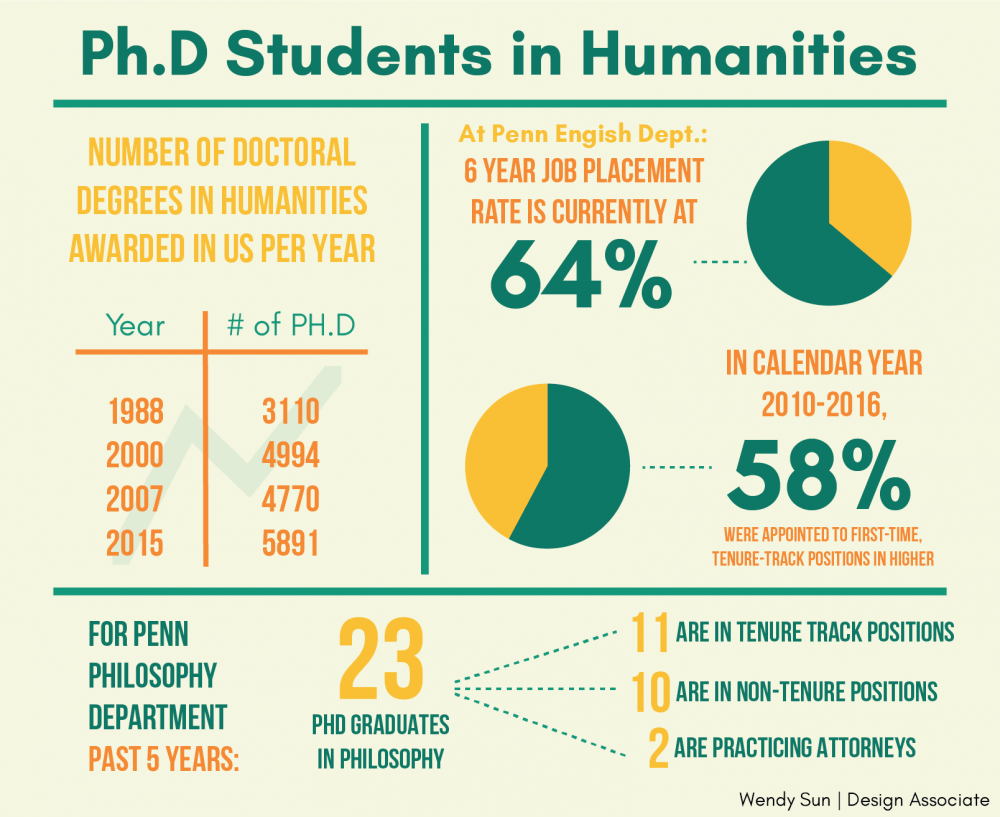
Job hunting at Penn brings up a distinct image of undergraduate students dressed in formal wear, hurrying down Locust Walk complete with backpacks and padfolios, but the scenario is quite different for graduates seeking jobs in academia.
In August, Inside Higher Ed released a report of the most recent statistics gathered by Academy of Arts and Sciences for their Humanities Indicator Project, which aims to provide an nonpartisan view of the state of the humanities in the United States today.
According to this report, the number of Ph.Ds awarded annually in the humanities has increased steadily from 4,700 in 2007 to 5,891 in 2015, but another analysis shows that across the same period, the number of academic job postings in humanities related fields has declined overall.
Robert Townsend, director of the Washington office of the Academy of Arts and Sciences, said it’s important to note the time delay in data due to the length of Ph.D. programs.
Since completing a humanities Ph.D. takes an average of eight years, “the rising numbers generally reflect admissions that occurred before the recession really hit, and before departments recognized that there would be a long-term change in the number of academic jobs,” he wrote in an email.
He also said that while admissions are declining in Ph.D. programs, it would take a number of years for that to be reflected in the number of Ph.D.s awarded.
Penn Philosophy Department Graduate Chair Samuel Freeman said he hasn’t seen a decline in the number of Ph.D.s awarded in philosophy at Penn, which averages five-to-six a year.
Out of the eight Penn philosophy graduates in 2016, all are employed, with five graduates in tenure-track positions, Freeman said.

“If you take the class of Ph.D.s, they have higher employment than anyone else,” Freeman said, “what they don’t have is the employment in universities – that’s what’s declining.”
He also added that he thinks there is a difference in job prospects for graduates from top-tier schools versus schools with lower ranking Ph.D. programs.
“If you take Ivy League Schools, Stanford – the top schools – generally they do pretty well [in job placements],” Freeman said.
Penn Philosophy graduate student Justin Bernstein said when applying to Philosophy Ph.D. programs, he only applied to those that would provide him with the best chances at job placement.
“I was worried about the career angle of it,” he said, but to mitigate his concerns about finding jobs after graduation, he told himself “[he] should only go to a top Ph.D. program that pays really well.”
Penn English Department Graduate Chair and English professor David Eng said in an email that his department has fared well in terms of placing its graduates in tenured-track jobs in comparison to other universities. One reason for this is the English department's reputation, Eng said.
According to U.S. News & World Report, Penn's graduate English department is tied for third best in the nation. It currently has a 64 percent six-year job placement rate.
“One variable for placement is also whether the people who have received degrees have geographical limits as to where they will apply, usually based on family and spousal considerations,” Penn History Department Graduate Chair and professor Peter Holquist said in an email.
According to Bernstein, the job search for humanities Ph.D.s is already beginning for certain positions. To look for jobs, he said that he uses the online service PhilJobs and plans on applying to about 80 to 100 jobs in total.
Although the job search process “hasn’t taken full effect yet,” Bernstein said that he could already feel the stress of the job search.
“You’re looking at what you’re doing for the past seven years and wondering whether people are going to read this and think that it’s a waste of time, so that’s really stressful,” he said.
The Daily Pennsylvanian is an independent, student-run newspaper. Please consider making a donation to support the coverage that shapes the University. Your generosity ensures a future of strong journalism at Penn.
Donate







